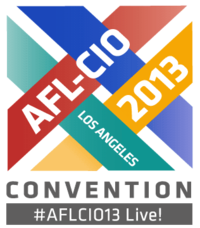Along with the outreach to alt-labor groups I discussed yesterday, the AFL-CIO Convention delegates have been weighing ways to form tighter associations with progressive groups like the NAACP, La Raza, the Sierra Club, the National Organization of Women, and others. In politics, these organizations frequently find themselves confronting the same movement conservatives. Some labor leaders even floated proposals to invite such organizations to affiliate with the AFL-CIO, even though they were not labor organizations. The construction unions, among others, expressed skepticism, and the resolution delegates in fact passed was fairly modest. AFL-CIO Building and Construction Trades Department President Sean McGarvey explained, “Giving people a seat where they have governance, and they don't represent workers, that was a bridge too far for lots of folks.”
Some of these political relationships are longstanding indeed. For decades, the civil rights movement and the labor unions fought the same Jim Crow Democrats in Congress; in time, their alliance transformed the Democratic Party, driving the most strident opponents of integration and workers’ rights out of the party or out of politics altogether. Other alliances are of more recent vintage, with many labor leaders joining with Latino organizations to support immigration reform with a path to citizenship, or with environmental groups to promote green jobs.
Certainly such a formal alliance would be a formidable force within the Democratic Party, but it would also impose important constraints on labor, subordinating the interests of workers and unions to other constituencies. (Construction) Laborers’ Union President Terry O’Sullivan, a supporter of the XL Pipeline and the jobs it would provide, asked, “Does that mean we are going to turn energy policy of the AFL-CIO over to the Sierra Club?”
Nor are progressives the only allies that labor needs. The USCCB is a critical ally in defense of the right to organize, the effort to raise the minimum wage, and the campaign for a fair and just immigration reform, but the Church is obviously at odds with the progressive left on abortion and the sanctity of the family. What unintended consequences might the AFL-CIO's new structure have for relations with Catholics and others outside the progressive fold who hold warm feelings for working people?
Although progressives might wish it so, workers’ interests do not always align with those of other constituencies on the left. Harold Schaitberger, president of the International Association of Firefighters, argued that workers deserve an organization with an eye single to their interests. “This is the American Federation of Labor. We are supposed to be representing workers and workers’ interests,” he said. “We are not going to be the American Federation of Progressive and Liberal Organizations.”








